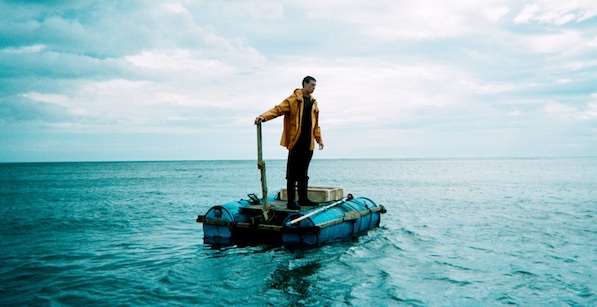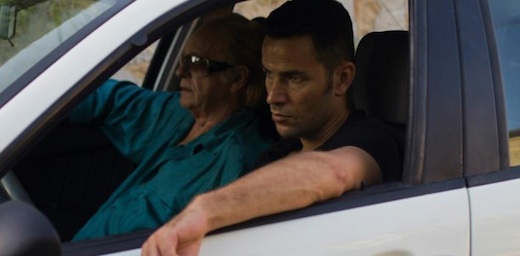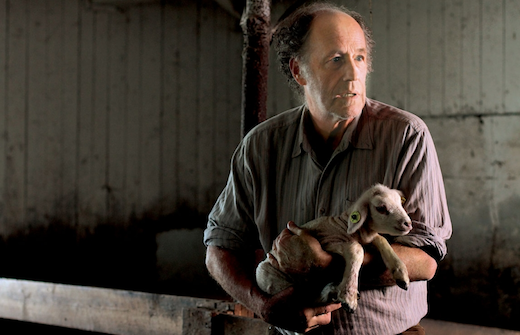The Miramar cinema, where Cannes Critics’ Week films screen, may be stuffy, but it does offer a breath of fresh air from the competitive, over-thought and loudly publicized films in the other sections of the Festival. Four days into the Festival, there are voices saying that the main competition is lacking true revelations, allowing in films that are average, yet favored with names of former winners and present favorites at Cannes. While Critics’ Week propositions might sometimes feel a little immature, or unduly radical in that young filmmaker way, they are nonetheless rich with potential and ideas, uncompromising in translating an author’s unique sensitivity into cinematic language. Critics’ Week refuses to conform and never ceases to surprise.
It started with a strong female accent. Not only is the director of the film that opened the 52nd Critics Week a woman (Katell Quillévéré, the author of internationally acclaimed feature debut Love Like Poison), the topic of the film is itself femininity and the different shades and forms it takes. Her second feature, Suzanne tells the story of a young woman who’s torn in between her maternal duties and her deep urge to love and be loved. Quillévéré focuses not only on Suzanne, but also on her sister and the complicated interruption of emotional symmetry between them. The topic itself might not be the most innovative, but the film is beautifully put together by someone, who has a natural directorial instinct and talent for working with actors. And the actors here are splendid, especially Sara Forestier and Adèle Haenel, who create a complex and believable landscape for their characters’ souls. Paul Hamy as Suzanne’s boyfriend introduces a much-needed element of danger and sensuality into the picture.
Fabio Grassadonia and Antonio Piazza’s Salvo is an interesting attempt at injecting a theoretically generic genre structure into an arthouse film. Set in Palermo, Sicily, it’s the story of a seemingly killer-for-hire named Salvo. After sneaking into a house to eliminate his enemy, he discovers Rita, his blind sister. The young woman becomes a sightless witness to her brother’s assassination; miraculously, the shock caused by this horrendous experience brings back her sight, which profoundly complicates her and Salvo’s relationship. Despite great camerawork and a quite hypnotic rhythm of the first third of the film, Salvo seems to be the weakest link in this year’s selection by far. Otherwise good acting doesn’t always find the right balance between the expressive and the gimmicky, flooding the audience with an overabundance of grimaces and gestures. With time passing, the onscreen intrigue is supposed to become richer with subtexts and possible solutions; unfortunately the viewer is gradually loosing genuine interest with the protagonists’ moral dilemmas or future prospects. Clean, powerful frames, intriguing light, a suggestive color palette and an almost absolute exclusion of dialogue does not make up for rather clichéd storyline and script, one that loses the tension it should be building until the very end.
Sébastien Pilote’s Le démantèlement might be one of those films that should not have its plot summarized on leaflets. It would have to be: “An aging lamb farmer faces tough choices when one of his daughters asks him for a loan that he cannot grant her without selling his beloved farm.” Such a description not only does not sound inviting, it’s also everything but fresh or intriguing. That’s why it’s much more adequate to embrace Pilote’s film by using terms referring to emotions and senses. Le démantèlement cherishes the complexity of, well, simplicity. It’s quiet and reflective and does not give easy solutions for the dilemmas it portrays. Pilote has a tender attitude toward his character, sixty three-year-old Gaby. However detached his practical decisions are from our world, he creates an immediate feeling of closeness with us. The viewer is never wiser than the protagonist, but can appreciate the time and space the film is giving him to reflect on all the doubts he’s gathered. Every human feature is multidimensional in this film: love and pain are inextricably bonded and gain doesn’t come without loss. So obvious, yet sometimes hard to grasp.
But it’s Paul Wright’s For Those in Peril that is by far my absolute favorite of the Critics’ week so far. A film that’s brave and uncompromising, showcasing such unique sensitivity enriched with a very distinct point of view, it’s the perfect example of what this section is about. (optimamedicalaz.com) The plot is quite simple: Aaron is the lone survivor of a strange fishing accident in which five other men lost their lives, including his older brother. Instead of being happy for his luck, the village turns against him, blaming him for what happened. Aaron, lingering on the border of mental disorder, doesn’t actually help anyone change their minds about him. It’s the way it’s executed that mesmerizes. Woven from inspirations as wide as Malickian synaesthetic cinema of vision, urban legends, found footage and fantasy, For those… is full of surprises and unexpected turns, truly an experience that is not to be forgotten. Moved and enchanted from the very beginning, for the whole seance I felt the film was good. But it was the last couple of shots that redefined everything and left me in wondering awe at Wright’s craft and work.
This is the first part of the 52nd Critics’ Week’s dispatch. For part two, visit this story on Keyframe. The section’s closing gala will take place on May 23. For more Fandor films that have screened at Cannes, please visit us our Cannes Festival page.








